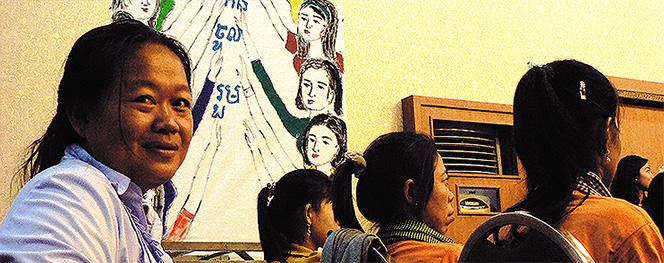About UN Women in Cambodia

Photo: UN Women Cambodia
UN Women’s work is driven by an emphasis on increasing women’s participation—in politics, in decision-making processes, and in economic and livelihood opportunities— and empowering them to know and claim their rights. Efforts have included:
- Strengthening the economic empowerment of marginalized rural women through the Fund for Gender Equality (FGE) Programme – “Strengthening the Economic Livelihood Opportunities” (SECLO) programme. This two year programme seeks to contribute to strengthening the economic rights of low-income and HIV-positive women in 12 provinces by increasing their access to economic livelihoods, raising the awareness of both rights holders and duty bearers and creating spaces for rural women to claim these, creating and/or strengthening networks of HIV positive women and increasing rural women’s access to basic services. The programme includes an important media component using both community radio and popular television programmes to ensure wide dissemination of its messages. It is being implemented by two local NGO’s (CHEMS and CHEC) in cooperation with the Ministry of Information (MoI), Ministry of Women’s Affairs (MOWA) and National Aids Authority (NAA).
- Expanding democratic governance through increased participation of women in both formal and informal decision-making processes – UN Women supports NGOs to promote women’s participation in the electoral process. A partnership with women’s NGOs in the lead-up to commune elections in 2007 providing training for female candidates on governance and election campaigning, alongside training to raise voter’s awareness about the importance of women’s representation in politics. Post election data showed that in 2007 female candidates rose to 21% from 15% in 2002 and number of women elected increased to 15% from 8.5%.
- Engendering national planning and policy-making – UN Women provides technical support to government institutions such as MOWA and other ministries to integrate gender principles into the development, implementation, and monitoring of national development strategies, budgets and other sectoral plans. Support is also going towards monitoring commitments to CEDAW, the MDGs, Neary Rattanak III, and UNSC Resolution 1325.
- Promoting the economic empowerment of the most excluded women who are ethnic minority women, HIV-positive women, and women with disabilities – UN Women supports the use of gender-responsive budgeting among government and civil society to monitor resource allocation to improve women’s economic situation. UN Women addresses rights violations of women migrant workers, and builds their awareness of ‘safe migration’ issues. UN Women is developing a standardized pre-departure training module and is also working with the government to ensure gender-sensitive implementation of sub-decrees to protect the rights of migrant workers.
- Promoting the leadership and participation of HIV-positive women’s organizations and women affected by HIV/AIDS – In engendering of Cambodia’s third National Strategic Plan for a Comprehensive and Multi-sectoral National Response to HIV and AIDS (NSP III), UN Women works with the government in shaping the policies, programmes, and resource allocations that address the HIV/AIDS epidemic.
- Mapping the situation of women with disabilities in Cambodia using the framework of CEDAW – UN Women supports the National Policy for Gender Equality - Neary Rattanak III, the Cambodian Millennium Development Goals and the National Action Plan for People with Disabilities.
- Addressing violence against women – UN Women supports government partners to collect and analyze data, develop policies and institutionalize services required to prevent and respond to gender-based violence. A partnership with MOWA has helped to strengthen inter-ministerial coordination to implement and monitor the National Plan to Prevent VAW. Ongoing support will o be provided to public awareness-raising campaigns organized by gender advocates including the UN Secretary-General’s UNiTE to End Violence against Women campaign initiatives.
Latest news
01/05/2025